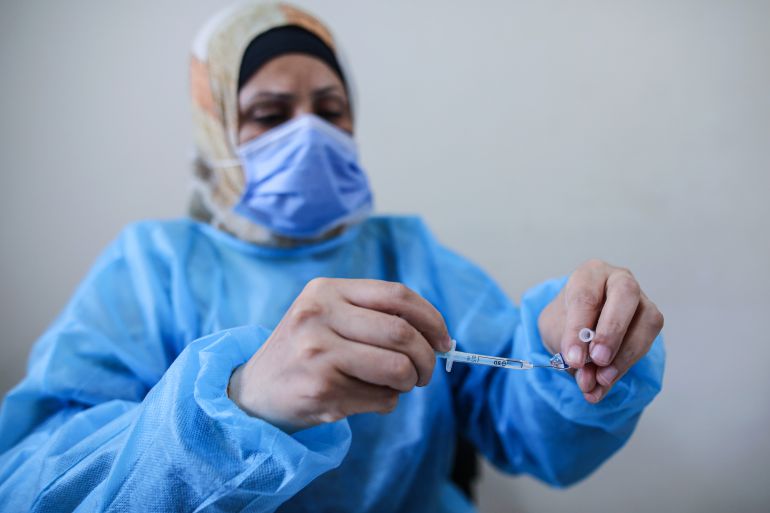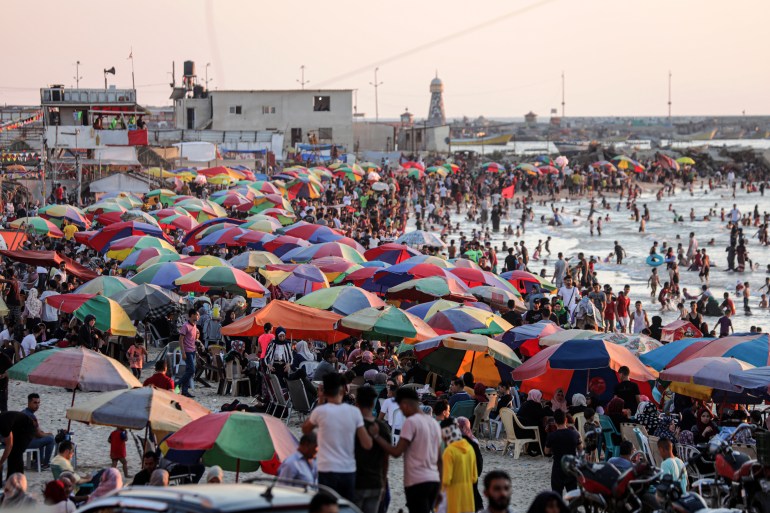Reluctance and distrust define vaccine attitudes in Gaza
Widespread reluctance to get a shot has led officials and medics to launch campaign about positive effects of vaccination.

More than five months since the arrival of the first batch of COVID-19 jabs in the Gaza Strip, the vaccine rollout in the besieged coastal enclave has been met with general distrust and, in many cases, outright refusal.
According to data from Gaza’s health ministry, some 98,000 people – or just less than five percent of the two million population – have so far received a shot.
Keep reading
list of 3 itemsIsraeli attacks on Gaza may constitute ‘war crimes’: UN
Gaza: 11 Days in May
To date, authorities in the Strip have confirmed more than 115,000 COVID-19 cases and 1,089 deaths. There are currently 43 patients treated in hospital, 34 of whom are in intensive care units (ICU).
Hind al-Maqoosi, 69, is among the hospitalised. Her daughter, Sana, said the entire family is afraid to take the vaccine.
“We think it does more harm than good,” Sana said, speaking from her mother’s bedside at the Palestine-Turkey Friendship hospital in Gaza City.
“I was infected with COVID-19 but refused to get vaccinated after,” Sana added. “The health ministry says it is beneficial but other people say it is not. Getting the coronavirus disease is inevitable.”

While health authorities have repeatedly stressed the importance of undertaking the necessary precautions, physical distancing is difficult in Gaza, one of the most densely populated areas in the world. On weekends, the enclave’s beaches are typically overwhelmed with families living under a crippling 14-year Israeli-Egyptian blockade that has, among others, restrained their movement beyond the Strip.
Gaza’s health infrastructure, already in bad shape due to the siege, was dealt another heavy blow during the last Israeli 11-day offensive in May, which killed 260 Palestinians, including 66 children.
The bombings damaged dozens of health centres, including six hospitals and Gaza’s main COVID-19 laboratory, as well as the health ministry’s offices. Two prominent doctors – neurologist Moeen al-Aloul and Ayman Abu al-Ouf, the head of internal medicine at Shifa hospital who was also heading the COVID-19 ward – were among those killed.

Scepticism and misinformation
Suhair Zakkout, spokeswoman for the International Committee of the Red Cross (ICRC) in the Gaza Strip, said its health sector has long faced major systemic issues, including the lack of medicines and fuel and energy crises, that affect the quality of healthcare available for the population.
Throughout the pandemic, the ICRC has supported the authorities and the Palestinian Red Crescent Society with medical equipment, personal protective equipment and masks.
Some 336,300 vaccine doses have also been donated from various countries, including Russia and the United Arab Emirates, as well as through the global COVAX programme.
The reluctance of people to get vaccinated, however, has raised concerns and prompted the ICRC – alongside the health ministry and the ministry of endowment and religious affairs – to launch a campaign aimed at increasing awareness about the positive effects of the shots.
“The campaign, which comprises radio spots, billboards, videos, media and social media products, will use trustworthy medical information, health advice, the hadith and verses of the Quran to encourage and reassure people in Gaza that vaccines are safe to take and help to combat the spread of COVID-19,” Zakkout told Al Jazeera.
“We are worried about the scepticism and misinformation that is spreading in Gaza,” she said, adding that the campaign, which has also recruited local social media influencers and activists to help spread the message, seeks to support “the efforts of the authorities to encourage people to take the vaccine”.
Maya Humaid, a social media activist, said one of the main reasons for people in Gaza not taking the vaccine was fear.
“There’s a lot of people who don’t believe the virus even exists, and live on fatalism,” she said. “After the war in May, people have generally relaxed precautionary measures such as wearing masks. They say, ‘we didn’t die in the war, so how are we going to die from a virus?’”
“Our role as influencers is to talk about the vaccine and its benefits on our platforms, in order to dispel rumours and spread the correct information,” she added. “We can’t force people to take the vaccine, but at every vaccination centre there are doctors and nurses who first explain the safety and benefits and give out practical information before and after getting the vaccine.”
‘Vaccine is not inoculation of death’

Dr Marwan al-Hams, director of the coronavirus ward at the Palestine-Turkey Friendship Hospital, said that despite the lack of medical equipment and supplies due to the blockade, Gaza “nevertheless has a cohesive health system” in comparison to other countries in the region.
“Thankfully, our cases in the Gaza Strip remain low in proportion to the population, but the lack of response from many people regarding the seriousness of COVID-19 – some flat-out deny that it exists – invariably leads to the spread of the disease,” he told Al Jazeera.
Al-Hams credits the setting up of a field hospital by the Rafah border crossing to quarantine incoming travellers as the reason for delaying a surge in cases in the Strip, which experienced its first serious outbreak of COVID-19 in November 2020.
The field hospital, which was ran by al-Hams, was closed down, and cases were initially then transferred to the European Hospital in Khan Younis, which had 300 beds and 60 in the ICU.
“After the outbreak, every hospital throughout the Strip now has a COVID-19 ward,” al-Hams said. “There is no Delta variant yet but we do fear a third wave,” he added, issuing a plea to Gaza’s residents to get vaccinated.
“The vaccine is not an inoculation of death. They shouldn’t believe the misinformation that is circulating on social media but instead [get information] from reliable sources.”

Additional reporting by Hosam Salem in the Gaza Strip